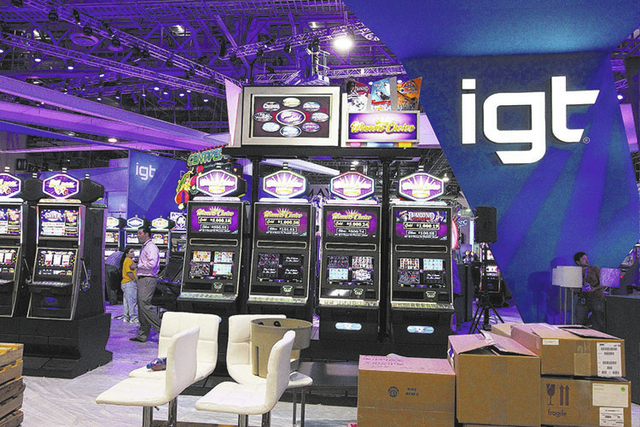Many do-si-dos, lead, at last, to a deal
The $6.4 billion acquisition of slot machine manufacturer International Game Technology by lottery provider GTECH shouldn’t have surprised anyone in gaming.
A deal between the two industry giants almost happened 14 years ago, albeit with different corporate players and under different circumstances.
IGT almost bought GTECH.
“This is a dance that has been going on for 20 years,” said one gaming industry insider with knowledge of the two companies’ history.
Former IGT Chairman Charles Mathewson confirmed in an interview the companies were “less than one-quarter of a point” from reaching agreement in 2000, with IGT buying GTECH.
“It was great overlap between two great companies from two industries,” Mathewson, 85, said from his office in Reno. “GTECH was having some problems in London and Brazil, but we just couldn’t get things finalized.”
Five years later, Mathewson, then-IGT CEO T.J. Mathews and other executives boarded the corporate jet and flew to GTECH’s headquarters in Rhode Island. Again, the intent was to buy the lottery operator.
Again, the transaction couldn’t be finalized.
A year later, Italy-based Lottomatica bought GTECH, moved the corporate offices to Rome and assumed the GTECH name. The company got healthy with new ownership and increased visibility through new domestic and international lottery contracts.
In fiscal 2013, GTECH reported more than $4 billion in revenue.
Meanwhile, IGT entered a long tailspin.
IGT’s stock price is 61 percent below what was 10 years ago. The company’s revenue declined 27 percent from 2007 to 2009. During the quarter ended March 31, IGT profits fell 66 percent; the company lowered its financial expectations for the year and it reduced its worldwide workforce by 7 percent.
Nearly a month after all but announcing it was up for sale, IGT was bought by GTECH for $4.7 billion in cash and stock, and assumption of $1.7 billion in debt.
GTECH shareholders will own 80 percent of the new company, which will be listed on New York Stock Exchange when the deal closes next year. The De Agostini Group, which owns 59 percent of GTECH, will have 47 percent of the new company.
Mathewson was part of a group led by analyst-turned-investor Jason Ader in 2013’s proxy fight over seats on IGT’s board. Ader’s group won just one of the three seats it sought.
Mathewson still owns IGT shares, but “not a significant” amount.
“Considering what happened with IGT, it’s a good deal for the shareholders,” Mathewson said.
In the late 1990s and early 2000s, IGT was an active acquirer. IGT bought several rival slot machine and gaming technology companies, helping to strengthen its position as the global slot machine leader.
A 1998 purchase of British slot maker Barcrest for $70 million moved the company into Europe. The 1999 acquisition of game developer Sodak Gaming of South Dakota for $230 million gave IGT a foothold in Indian casinos.
In 2005, IGT bought European online gaming developer WagerWorks for $90 million, which moved the company’s into interactive gaming.
The largest deal happened in 2001, when IGT bought Las Vegas-based Anchor Gaming for $1.37 billion. The deal gave the company full control of several slot machine titles, including “Wheel of Fortune.” (Full disclosure: I was Anchor Gaming’s head of corporate communications when the deal took place).
IGT’s two most recent acquisitions had different outcomes.
In 2012, CEO Patti Hart — who replaced Matthews in 2009 — engineered the $500 million buyout of social gaming giant Doubledown Casino. Investors roundly criticized the deal, particularly the amount IGT paid for a free-to-play website with the largest presence on Facebook.
Hart has been vindicated in recent months. IGT’s largest quarterly revenue increases have come from its interactive division, led by Doubledown. Meanwhile, rival slot machine manufacturers — notably Bally Technologies — are making deals to gain presence in social gaming.
However, IGT’s 2011 purchase of Sweden-based online poker operator Entraction for $115 million blew up a year later. Several European countries changed regulations and IGT pulled the plug on its online poker operations.
Wall Street likes the GTECH-IGT deal because of the growing intersection of slot machines and lotteries. Using similar products on multiple platforms reduces research and development costs and is part of the $280 million in corporate savings the transaction is expected to bring over the next three years.
“Given the convergence of gaming and the different channels of content — casinos, social gaming, Internet gaming, lottery, etc. — we expect further gaming consolidation,” Macquarie Securities gaming analyst Chad Beynon said.
With GTECH providing the operating systems and management for some of largest U.S. state lotteries — California, Texas, New York, Florida, Illinois, Georgia — expect to see IGT’s popular slot machine titles in lottery games.
Bank of America gaming analyst Shaun Kelley said the transaction is further evidence that the merger of lottery, land-based casinos and online gaming is playing out.
In 2013, New York-based lottery provider Scientific Games spent $1.5 billion for slot machine manufacturer WMS Industries.
“These acquisitions have been product and geographic extensions rather than true consolidation of competitors,” Eilers Research founder Todd Eilers told investors. “As such, we don’t anticipate much to change as it relates to competition within the U.S. market as it stands today.”
However, analysts noted slot machine makers Multimedia Games of Austin, Texas, and Australia-based Ainsworth Game Technology could be on some company’s shopping list.
Howard Stutz’s Inside Gaming column appears Wednesdays and Sundays. He can be reached at hstutz@reviewjournal.com or 702-477-3871. Follow on Twitter: @howardstutz.

















